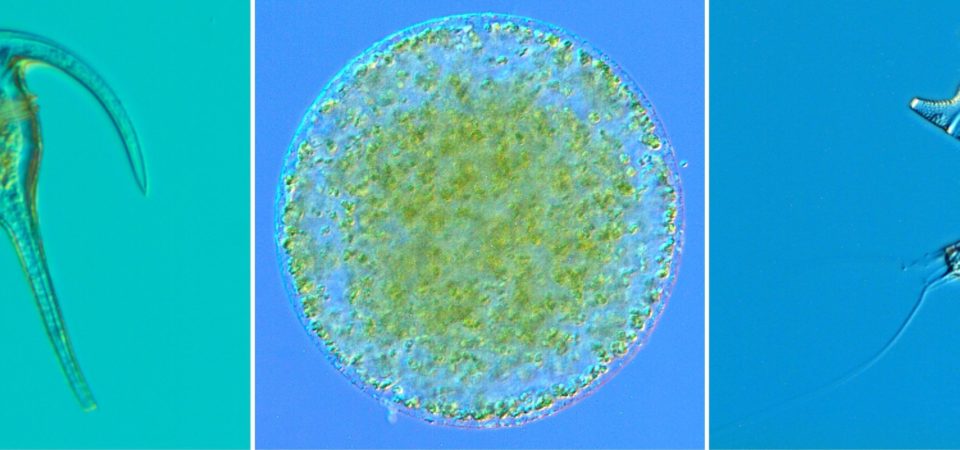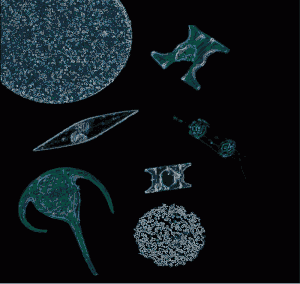Microscopic, marine-dwelling, solar-powered engines of the planet: Our future depends on them
In a time when conservation is paramount many of us are inclined to take pause and think about the consequences of our continual destruction and exploitation of Earth’s natural resources and question our actions or inactions for the long-term benefit of humanity and the planet. Since the ‘green revolution’ of the 1960s, we have been taught to see the rainforests as the lungs of the Earth, inspiring many of us to be passionate about their preservation and protection. While this is a worthy and important fight, we often forget that 50% of our oxygen comes from microscopic solar powered engines that live in the surface waters of our ocean. Phytoplankton (‘phyto’ meaning plant and ‘planktos’ meaning wanderer) while tiny in size, are large in number and colossal when it comes to global importance. Their power is derived from their numbers. In every teaspoon of seawater there can be up to 1000 of these paradoxically mighty plants that are invisible to the naked eye. In fact, if we multiply this cell density by the volume of the surface ocean and put each cell end to end, the phytoplankton chain would reach far beyond our neighbouring stars. As with land plants, these tiny wanderers use the sun’s energy to convert sunlight and CO2 into sugars and oxygen through the process of photosynthesis. They are essentially the floating rainforests of the ocean, the partner lung to the Amazon. As we move into an uncertain future, with the continual land clearing and indefensible destruction of our forests, it is likely that the contribution of these solar powered cells to the drawdown of CO2 and production of oxygen is going to become even greater.
‘Earthlings’ often forget that more than 70% of the planet is actually covered by water and that the oceans account for 99% of the volume of all Earth’s living space. As bipedal land dwellers we can be forgiven for sometimes neglecting the importance of the health and sustainability of our oceans to our survival. However, let me remind you, that since the dawn of humanity, humanity has been living in close association with the coasts and oceans, deriving much of our protein and other resources from the sea. For the seven billion of us sharing our planet today, the sea provides more than 15% of our protein intake. Phytoplankton are the foundation species of the marine ecosystem, supporting the entire marine food web making possible the rich, although diminishing, diversity and fisheries resources that are an essential part of everyday human existence.
This vast expanse of blue is home to billions of organisms, many of which are undiscovered and the majority of which are microscopic in size, but unparalleled in importance. Oceans are integral in the regulation of our climate and with the rapid warming of our planet, it is even more important to understand their value and do our best to protect the services they provide. As the human population continues to rise well beyond ecologically sustainable levels, our marine biome is under increasing pressure and eventually this finely tuned system may collapse. The combination of resource pressure and environmental degradation with the rapidly changing climatic conditions has started to push our marine ecosystems into the unknown.
In May this year, atmospheric CO2 concentrations peaked at 400 ppm, a record level not experienced by the planet in over 3 million years and levels never experienced by many of the organisms currently in existence today, including Homo sapiens. The relentless spewing of carbon dioxide and other greenhouse pollutants into our atmosphere is rapidly altering the planet our children will inherit. It is to these microscopic plants, the floating forests of the ocean, that we must turn. For now, every second breath you take should be done so in homage to these vast floating forests, but as the future unfolds we may be depending a lot more heavily on these tiny power plants.
MAHB-UTS Blogs are a joint venture between the University of Technology Sydney and the Millennium Alliance for Humanity and the Biosphere. Questions should be directed to joan@mahbonline.org.
MAHB Blog: https://stagingphp.com/mahb/blog/ocean-power-plants
The views and opinions expressed through the MAHB Website are those of the contributing authors and do not necessarily reflect an official position of the MAHB. The MAHB aims to share a range of perspectives and welcomes the discussions that they prompt.

